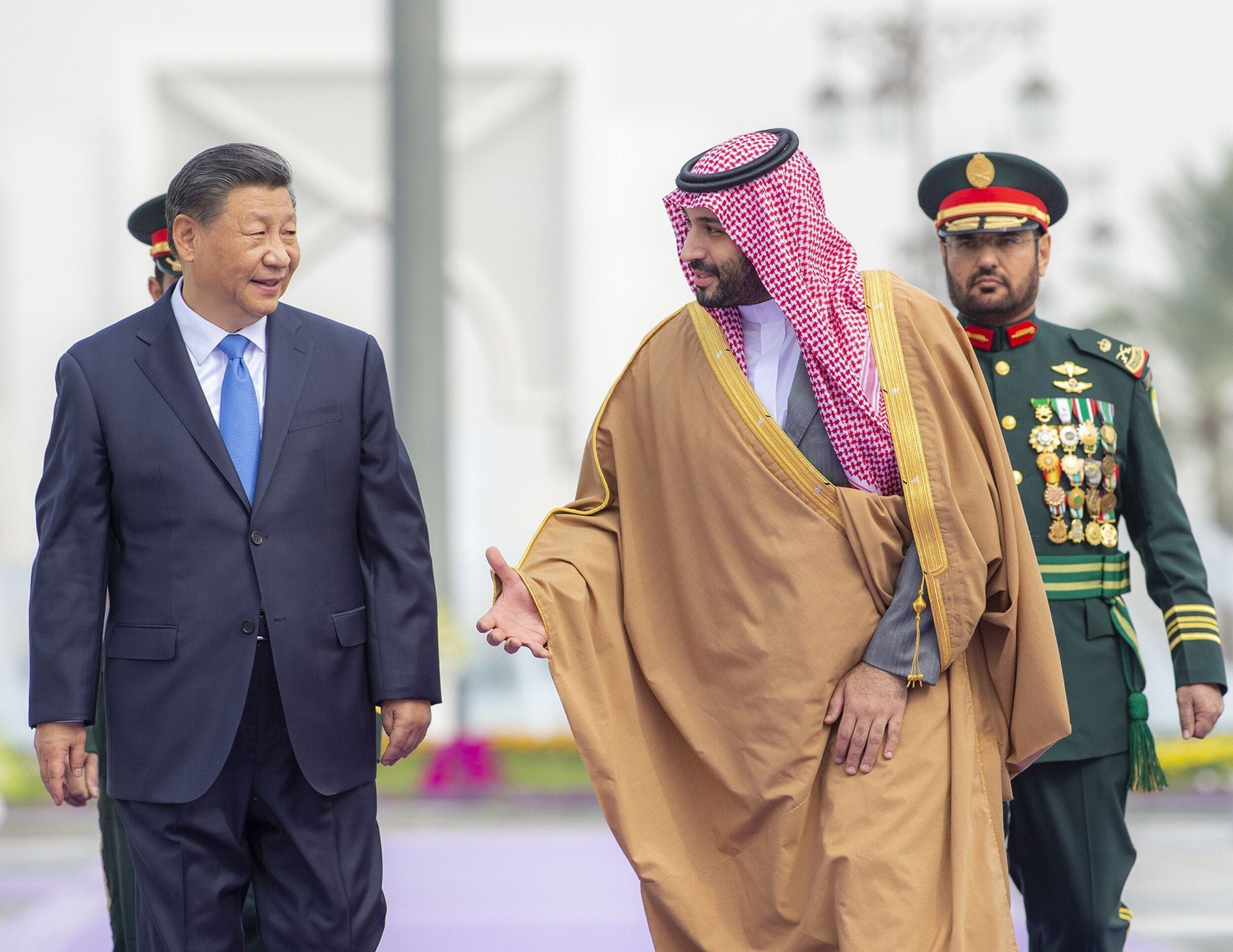Under US eyes, China-Saudi Arabia ties deepening, enter ‘new era’
Amid the series of provoking moves the US has been initiating against China in recent months, Xi Jinping's physical presence in Saudi Arabia is enough proof to indicate that the US has officially been check-mated by Beijing.
-

Saudi Crown Prince Mohammed Bin Salman welcomes Chinese President Xi Jinping in Riyadh, Saudi Arabia on December 8, 2022. (Royal Court of Saudi Arabia/Anadolu Agency/Getty Images)
Chinese President Xi Jinping said on Thursday that the strengthening of Beijing's relations with the Gulf marked the beginning of a "new era" in the development of Sino-Arab relations.
Xi was seen landing with an honorary escort from Saudi fighter jets earlier today in Ryadh, Saudi Arabia, and was met by Crown Prince Mohammed bin Salman for the purposes of signing strategic deals meant to reinforce bilateral relations between the two countries.
"The visit will carry forward our traditional friendship, and usher in a new era in China’s relations with the Arab world, with Arab states of the Gulf and with Saudi Arabia," said Xi in an opinion piece published in Saudi Arabia’s media, adding that the two sides "respect each other’s sovereignty and development path [and] respect each other’s history and cultural traditions."
At his meeting with Mohammed bin Salman, Xi was reported saying, "China considers the development of relations with Saudi Arabia a priority of its diplomacy in the Middle East, is ready to move along the path of national revival with Saudi Arabia, strengthen strategic ties aimed at development, deepen practical cooperation in all spheres," as quoted by CCTV.
Xi was further quoted as saying that China considers Saudi Arabia a strategic power in the multipolar world and recognizes the importance of developing a strategic partnership with the Kingdom, as he met with King Salman bin Abdulaziz in Riyadh.
On his part, Mohammed bin Salman was quoted as saying, "Saudi Arabia firmly adheres to the one-China principle, supports China in defending its sovereignty, security and territorial integrity, and supports China's deradicalization measures and efforts, firmly opposes outside interference in China's internal affairs under the pretext of protecting human rights," as cited by CCTV.
HRH Crown Prince of Saudi Arabia 🇸🇦, Mohammed Bin Salman Al-Saud, welcomes the President of China 🇨🇳 , HE Xi Jinping, to the Arab world. 🤝
— Ebrahim Hashem 李思瑞 إبراهيم هاشم (@EbrahimHashem) December 8, 2022
pic.twitter.com/n39D0hTYph
President Xi Jinping arrives at Al Yamamh Palace in Riyadh pic.twitter.com/pIwX6NzICW
— 🇷🇺 Эсса Али 🆉 Essa Ali 🇦🇪 (@ESSA_A1I) December 8, 2022
This marks an important defeat for the US, which has in the past prevented Saudi Arabia from effecting important advances in bilateral ties with Beijing.
During his three-day visit to Riyadh, Xi will not only be attending important Arab and Gulf summits but will also be signing a series of strategic partnership agreements that would see the leaders of both countries meet every two years.
The agreements also include 34 new ventures in various key sectors, including technology, telecommunications, energy, and construction.
Chinese tech company Huawei, which has lately been the target of American sanctions, is reportedly included in the MoU, wherein it plans to collaborate with the Saudi minister of communications to boost mobile internet and establish a cloud-computing facility.
The MoU also states that Chinese company Enovate Motors will collaborate on manufacturing 100,000 cars in Saudi Arabia per year.
Read more: Xi: China supports Arab states in defending sovereignty
On Washington's part, the US said it will be observing the state visit despite being well aware that Saudi Arabia is no longer fearing infuriating the US, as evidenced by the recent OPEC+ decision to slash oil production by 2 million barrels a day.
"We are mindful of the influence that China is trying to grow around the world," said US National Security Council Spokesperson John Kirby.
"The Middle East is certainly one of those regions where they want to deepen their level of influence," he said, adding that US policies are "better suited to preserving prosperity and security for countries around the world than those that are demonstrated or touted by China."
This is an alarming point for the US which has so far justified its hegemonic legitimacy on the basis that it provides defense capabilities to its allies.
Unlike China, the US traditionally relied on an expansionist policy to forcibly subdue nations to US hegemony - mainly through the promotion of an ideology of freedom and democracy, which violates the cultures and customs of foreign nations.
China, on the other hand, has relied on an enlargement policy to grow its trade influence, instead inviting foreign partners to voluntarily join in taking part in commercial trade practices.
To date, China is Saudi Arabia's biggest trading partner and Saudi Arabia is China's biggest supplier of crude.
Some see that this may be a retaliatory move in response to the recent provocations by the US in disrupting China's domestic affairs by tackling the Taiwan question.
Read more: China mulling holding Belt and Road International Forum next year

 4 Min Read
4 Min Read








